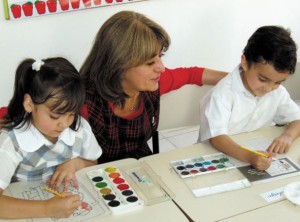
A supportive learning environment at home is very important for a child’s educational development. This positive environment makes their learning experience more meaningful. Creating a positive and supportive learning environment at home will help children develop effective study habits and get most out of their education. Parents and every family member play a great role in providing this positive learning experience in children. This way of learning must become a partnership and a bridge between home and school.
So how do we accomplish this? Here are a few tips to guide you in creating a positive and supportive learning environment for your child:
Develop a supportive learning environment at home by minimizing distractions.
Your home could be a secure and stable environment, but that does not mean it is free from distractions that can affect your child’s focus when studying. These could be the noises from the television, stereo, toys, console games, internet games etc. It is very important to let your child concentrate on learning. Minimizing distractions and creating a clutter free space at home where your child can be comfortable in learning can help him/her stay focus.
Encourage your child to study.
Do not force them. No matter how focused your child could be, there will be days that your child will get frustrated or feel uncomfortable with a particular subject or lesson. Giving 15-30 minutes break can be very supportive. Deviating from your usual study habits can also be helpful, like letting your child work on his/her favorite subject first.
Your positivity can be empowering.
It is very important to always stay positive. This will not only encourage your child to learn but will help them maintain their motivation.
Intellectual Stimulation is essential.
Identify strategies that helps stimulate your child’s mind and get rid of activities that do not help.
Maintain Open lines of Communications.
Communicate with your child. A parent-child discussion is always helpful when something about your study plan is not working. Listening to what your child wants and letting him/her express her opinion can help you work on new adjustments to make learning more comfortable for your child.
Keep track of your child’s learning progress.
Keeping a journal of your child’s progress will let you know what areas to work on and explore new solutions and approach.
For further discussion or any questions you may have about your child’s learning, their classroom teacher should be you starting point. As a secondary resource, Nepean Tutoring tutors are always available for informal discussion to provide advise or to organize testing and tutoring to enhance your child’s learning experience.
